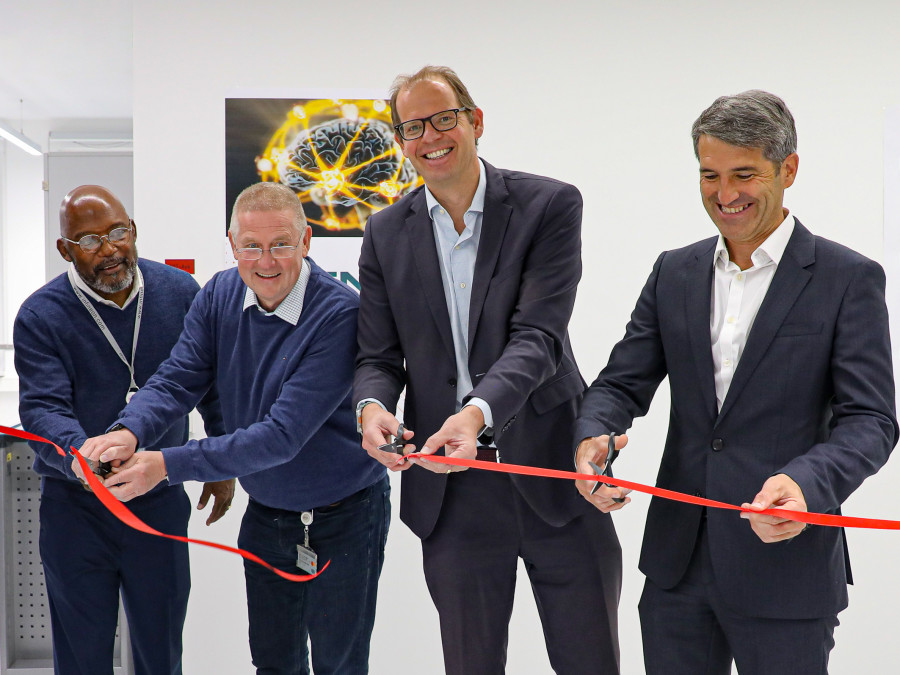Infineon opens laboratory for quantum electronics and Power AI

Infineon Technologies AG has opened a new laboratory for the development of quantum electronics in Oberhaching near Munich. The objective is to develop and test microelectronic circuits for quantum computers which will be stable and small, will operate reliably and which can be produced on an industrial scale. Approximately twenty researchers will work at the lab. In addition to quantum computing, activities will also focus on the development of AI algorithms for the early detection of variances in power systems.
"Infineon plans to reinvent the core element of the quantum computer. One of the central tasks of the new quantum laboratory will be to develop and test electronic systems for ion trap quantum computing with the objective of integrating these systems in the Quantum Processing Unit. This is a prerequisite for making quantum computing scalable and useable," says Richard Kuncic, Senior Vice President and General Manager Power Systems at Infineon Technologies. "Thanks to their computing power, quantum computers will revolutionize many applications. But before quantum computers will have to be industrialized, a process which we are driving ahead in our new laboratory."
Accordingly, the company has installed an innovative cryostat, a kind of super-refrigerator which can cool down to temperatures as low as 4 degrees Kelvin (-269 degrees Celsius). Qubits, the smallest units for calculations with quantum computers, are extremely sensitive and only adequately stable under extreme conditions, typically temperatures below -250 degrees Celsius and at the lowest possible pressures. And the electronic systems have to keep working perfectly in spite of these extreme conditions. In environments this cold, many materials change their properties, including their electric behavior.
Although there are already a substantial number of quantum computers, these are installations made by and for research facilities. Several development steps will have to be mastered before scaling to powerful quantum computers and industrialization of the technology. This includes the precise electronic manipulation of hundreds and thousands of qubits. Among other things the team in Oberhaching is developing optical detectors for reading out the quantum states of the ions. Here the colleagues work together closely with the Infineon quantum laboratory in Villach, which itself specializes in ion traps. The new lab will also pursue synergies with the colleagues in Dresden and Regensburg who conduct research on silicon and superconductor qubits.
In the area of power semiconductors, the laboratory will use Artificial Intelligence to simulate and better predict the aging and failure characteristics of microelectronics in the Power sector. This calls not only for the development of the necessary algorithms; much more, practical measurements will have to establish the data basis for training neural networks and verifying their behavior. This will help better estimate the service life of power converters and will aid in detection of anomalies. These insights are important for effective proactive maintenance, which is ultimately to prevent equipment failure and thus optimize periods of use.

Desde 1982, la Asociación de Investigación y Cooperación Industrial de Andalucía, coopera con diferentes sectores industriales, abordando tendencias en auge como el hidrógeno verde. Nos los explica Alfredo Iranzo, investigador del Grupo de Termotecnia de AICIA.

Según resultados preliminares presentados por la Federación Internacional de Robótica (IFR), la inversión en automatización de la industria automovilística en Europa sigue creciendo. El número total de robots industriales instalados ha alcanzado los 23.000 en 2024, lo que supone el segundo mejor resultado en cinco años.

Mitsubishi Motors ha lanzado el nuevo ASX HEV, una versión profundamente renovada de su SUV compacto, fabricada en Valladolid, que incorpora esta motorización híbrida de última generación.

JLR ha desvelado detalles sobre el riguroso programa de pruebas de sus asientos, que incluye cuatro robots específicos (KUKA Occubots) que simulan cada uno una década de sentarse, moverse y girar en cuestión de días para garantizar que los clientes de los vehículos de lujo de la compañía se sienten cómodamente.

Sébastien Guigues, hasta ahora director general de las marcas Renault y Alpine en España, ha sido nombrado director general de la marca Renault en Italia, y director país Renault Group Italia, el segundo mercado más importante del Grupo. Jesús Bóveda ocupará su cargo de forma interina hasta que se anuncie al sucesor de Guigues en España.
